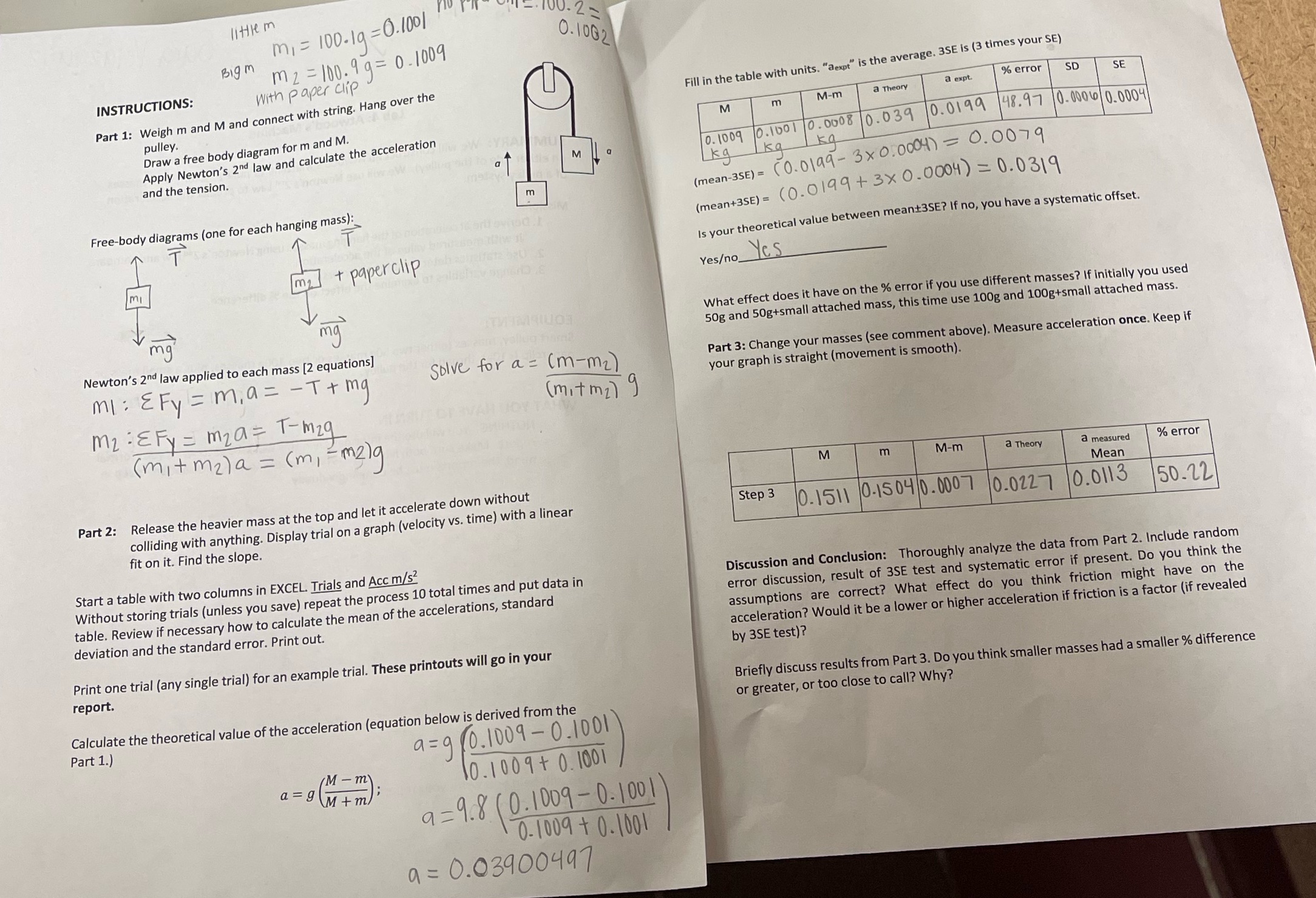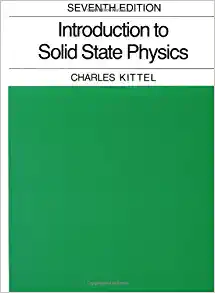Answered step by step
Verified Expert Solution
Question
1 Approved Answer
Write a lab report and include a theory. little m mi = 100-19 = 0.100/ 100.2- Bigm 0. 1002 m 2 = 100. 9 9
Write a lab report and include a theory.
 little m mi = 100-19 = 0.100/ 100.2- Bigm 0. 1002 m 2 = 100. 9 9 = 0- 1009 INSTRUCTIONS: with paper clip Part 1: Weigh m and M and connect with string. Hang over the Fill in the table with units. "aexpt" is the average. 3SE is (3 times your SE) pulley. a expt % error SD a Theory SE Draw a free body diagram for m and M. M m M-m Apply Newton's 2nd law and calculate the acceleration and the tension. 0. 1009 0.1001 0. 0008 0.039 0. 0199 148. 97 0. 0006 0. 0004 M ka kq kq m mean-3SE) = ( 0. 0199 - 3 x 0:0004) = 0. 0079 Free-body diagrams (one for each hanging mass): T (mean+3SE) = (0.0199+ 3x0-0004) = 0.0319 Is your theoretical value between mean+3SE? If no, you have a systematic offset. my + paperclip Yes/ no Yes ng mg What effect does it have on the % error if you use different masses? If initially you used 50g and 50g+small attached mass, this time use 100g and 100g+small attached mass. Newton's 2nd law applied to each mass [2 equations] MI : EFy = m, a = - T+ mg solve for a = (m-mz) Part 3: Change your masses (see comment above). Measure acceleration once. Keep if ( mitmz ) ) your graph is straight (movement is smooth). M2 : EFy = mza = T- mzg ( mitz)a = ( m, = mzig M m M-m a Theory a measured % error Part 2: Release the heavier mass at the top and let it accelerate down without Mean colliding with anything. Display trial on a graph (velocity vs. time) with a linear Step 3 it on it. Find the slope. 0.1511 0-15 04 0. 0007 0.0227 0.0113 50. 22 Start a table with two columns in EXCEL. Trials and Acc m/s? Without storing trials (unless you save) repeat the process 10 total times and put data in Discussion and Conclusion: Thoroughly analyze the data from Part 2. Include random table. Review if necessary how to calculate the mean of the accelerations, standard error discussion, result of 3SE test and systematic error if present. Do you think the deviation and the standard error. Print out. assumptions are correct? What effect do you think friction might have on the acceleration? Would it be a lower or higher acceleration if friction is a factor (if revealed Print one trial (any single trial) for an example trial. These printouts will go in your by 3SE test)? report. Briefly discuss results from Part 3. Do you think smaller masses had a smaller % difference Calculate the theoretical value of the acceleration (equation below is derived from the or greater, or too close to call? Why? Part 1.) a = 9 10. 1009 - 0. 10 01 (M - m) 10. 1009 + 0.10 01 a =g (M + ml 9 = 9.8 (0.1009 - 0.1001) 0-1009 + 0.1001 a = 0.03900497
little m mi = 100-19 = 0.100/ 100.2- Bigm 0. 1002 m 2 = 100. 9 9 = 0- 1009 INSTRUCTIONS: with paper clip Part 1: Weigh m and M and connect with string. Hang over the Fill in the table with units. "aexpt" is the average. 3SE is (3 times your SE) pulley. a expt % error SD a Theory SE Draw a free body diagram for m and M. M m M-m Apply Newton's 2nd law and calculate the acceleration and the tension. 0. 1009 0.1001 0. 0008 0.039 0. 0199 148. 97 0. 0006 0. 0004 M ka kq kq m mean-3SE) = ( 0. 0199 - 3 x 0:0004) = 0. 0079 Free-body diagrams (one for each hanging mass): T (mean+3SE) = (0.0199+ 3x0-0004) = 0.0319 Is your theoretical value between mean+3SE? If no, you have a systematic offset. my + paperclip Yes/ no Yes ng mg What effect does it have on the % error if you use different masses? If initially you used 50g and 50g+small attached mass, this time use 100g and 100g+small attached mass. Newton's 2nd law applied to each mass [2 equations] MI : EFy = m, a = - T+ mg solve for a = (m-mz) Part 3: Change your masses (see comment above). Measure acceleration once. Keep if ( mitmz ) ) your graph is straight (movement is smooth). M2 : EFy = mza = T- mzg ( mitz)a = ( m, = mzig M m M-m a Theory a measured % error Part 2: Release the heavier mass at the top and let it accelerate down without Mean colliding with anything. Display trial on a graph (velocity vs. time) with a linear Step 3 it on it. Find the slope. 0.1511 0-15 04 0. 0007 0.0227 0.0113 50. 22 Start a table with two columns in EXCEL. Trials and Acc m/s? Without storing trials (unless you save) repeat the process 10 total times and put data in Discussion and Conclusion: Thoroughly analyze the data from Part 2. Include random table. Review if necessary how to calculate the mean of the accelerations, standard error discussion, result of 3SE test and systematic error if present. Do you think the deviation and the standard error. Print out. assumptions are correct? What effect do you think friction might have on the acceleration? Would it be a lower or higher acceleration if friction is a factor (if revealed Print one trial (any single trial) for an example trial. These printouts will go in your by 3SE test)? report. Briefly discuss results from Part 3. Do you think smaller masses had a smaller % difference Calculate the theoretical value of the acceleration (equation below is derived from the or greater, or too close to call? Why? Part 1.) a = 9 10. 1009 - 0. 10 01 (M - m) 10. 1009 + 0.10 01 a =g (M + ml 9 = 9.8 (0.1009 - 0.1001) 0-1009 + 0.1001 a = 0.03900497 Step by Step Solution
There are 3 Steps involved in it
Step: 1

Get Instant Access to Expert-Tailored Solutions
See step-by-step solutions with expert insights and AI powered tools for academic success
Step: 2

Step: 3

Ace Your Homework with AI
Get the answers you need in no time with our AI-driven, step-by-step assistance
Get Started


